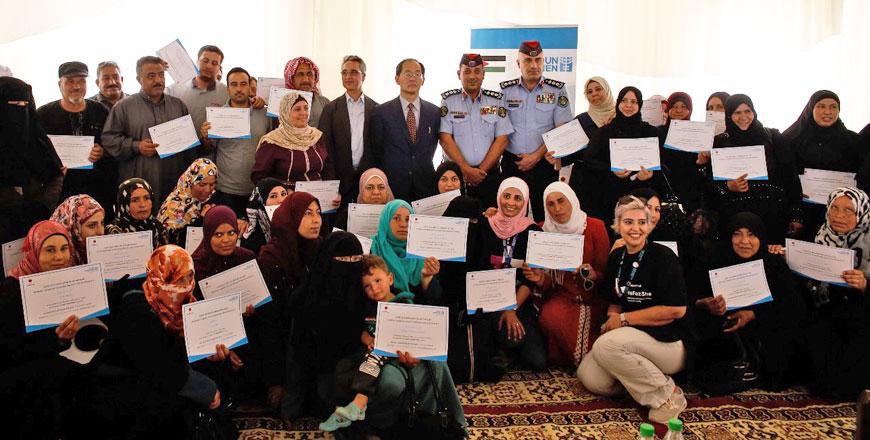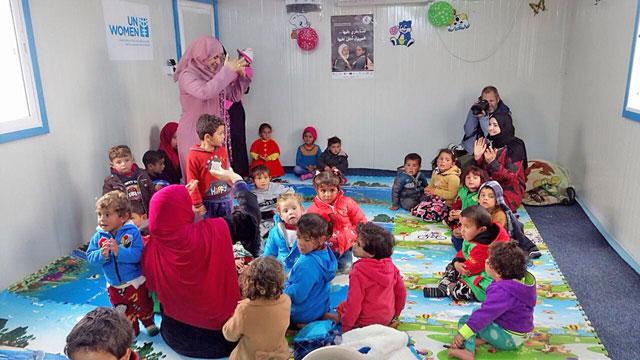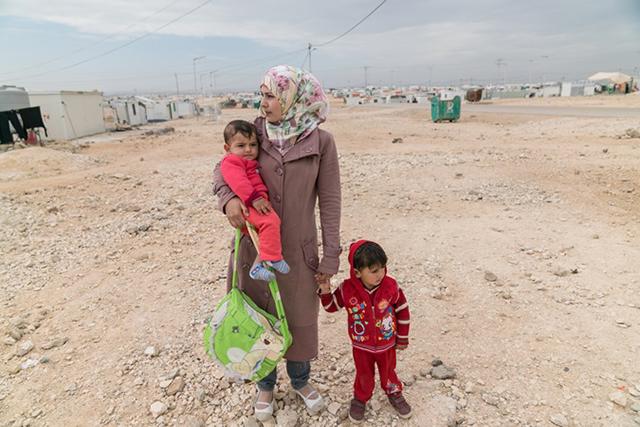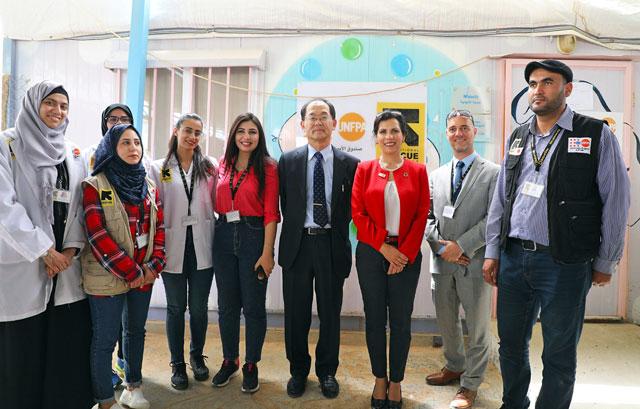You are here
Graduation highlights resilience of Syrian women in Azraq
By Elizabeth Turnbull - Jul 11,2019 - Last updated at Jul 11,2019

Graduates of the UN’s Entity for Gender Equality and the Empowerment of Women’s Skills Building Programme and Japanese Ambassador to Jordan Hidenao Yanagi pose for a photo on Wednesday (Photo courtesy of UN Women)
AZRAQ CAMP — In 2016, Torfa Aldroboi arrived at Azraq camp with her five children. Although she was free from the conflict in Syria, life remained difficult, she said.
While Azraq is free of political crisis, it has few job opportunities for older men and because of her husband’s age, she had to navigate both caring for her children and providing for them financially.
This Wednesday, Aldroboi was applauded as she walked past onlookers to receive a certificate from Japanese Ambassador to Jordan Hidenao Yanagi. She was one of 50 Syrian refugee women who successfully graduated from the United Nations Entity for Gender Equality and the Empowerment of Women’s Skills Building Programme on Wednesday.
“[This programme] has only been possible because of the women we work with, represented here today by these graduates, whose vision for a more peaceful and prosperous future is generating hope for many,” UN Women Jordan Representative Ziad Sheikh said at the event.
The UN Women’s incentive-based volunteerism project, funded by Japan, aims to equip vulnerable women with job skills, promote empowerment and meet protection concerns, according to a UN Women report e-mailed to The Jordan Times.
In June, one in four households in Azraq, some 100 kilometres east of Amman, was headed by a woman and of the 35,709 Syrian refugees who live in the camp, 22 per cent were under the age of five, according to UNHCR statistics.
“We hope that the support for this project directly contributed to building... empowerment for Syrian women in the camp,” Yanagi said Wednesday.
Funded by Japan, UN Women operates one of four Oasis Centres for Women and Girls in Azraq, which provides livelihood training and services for those at risk of and those who have survived gender-based violence. The centre also supports civic engagement and education, according to UN Women.
Of the women surveyed about these centres, 98 per cent of women reported an increase in self-esteem, dignity and confidence and more than 20 per cent reported a decrease in gender-based violence. In addition, 16 per cent of women now consider opening a small business, according to Sheikh.
Regardless of such progress, Sheikh pointed out that challenges still remain for Syrian women, as less than 5 per cent of work permits issued to refugees go to women.
Lack of childcare, transportation and support are also difficult to overcome for women who want to work, according to Sheikh.
The UN official describes self-worth and confidence as some of the greatest impacts of the programme, and one of the most important consequences of women making money is that they can be become more involved in the household decision-making process.
“I’d like to assure that Japan, as a responsible member of the international community, will continue to provide support to the Syrian refugees who are living in this serious condition and to the hosting communities in Jordan,” Yanagi said.
Related Articles
AZRAQ REFUGEE CAMP — The United Nations Entity for Gender Equality and Women Empowerment (UN Women) on Tuesday launched its first “Oasis” sp
AMMAN — The Government of Japan is partnering with the United Nations Entity for Gender Equality and Women’s Empowerment (UN Women) to incre
AMMAN — Japanese Ambassador to Jordan Hidenao Yanagi visited the Azraq refugee camp on Sunday to inaugurate the start of a Japanese funding


















